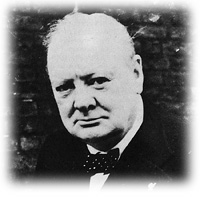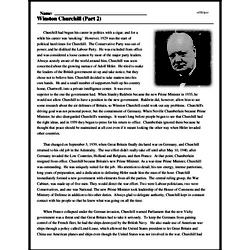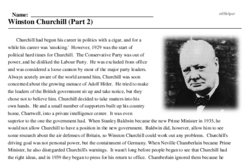Winston Churchill (Part 2)
Winston Churchill Day
Reading Comprehension for April 9
Churchill had begun his career in politics with a cigar, and for a while his career was 'smoking.' However, 1929 was the start of political hard times for Churchill. The Conservative Party was out of power, and he disliked the Labour Party. He was excluded from office and was considered a loose cannon by most of the major party leaders. Always acutely aware of the world around him, Churchill was soon concerned about the growing menace of Adolf Hitler. He tried to make the leaders of the British government sit up and take notice, but they chose not to believe him. Churchill decided to take matters into his own hands. He and a small number of supporters built up his country home, Chartwell, into a private intelligence center. It was even superior to the one the government had. When Stanley Baldwin became the new Prime Minister in 1935, he would not allow Churchill to have a position in the new government. Baldwin did, however, allow him to see some research about the air defenses of Britain, so Winston Churchill could work out any problems. Churchill's driving goal was not personal power, but the containment of Germany. When Neville Chamberlain became Prime Minister, he also disregarded Churchill's warnings. It wasn't long before people began to see that Churchill had the right ideas, and in 1939 they began to press for his return to office. Chamberlain ignored them because he thought that peace should be maintained at all cost even if it meant looking the other way when Hitler invaded other countries.
That changed on September 3, 1939, when Great Britain finally declared war on Germany, and Churchill returned to his old job in the Admiralty. The war effort didn't really take off until after May 10, 1940, after Germany invaded the Low Countries, Holland and Belgium, and then France. At that point, Chamberlain resigned from office. Churchill became Britain's new Prime Minister. As a war-time Prime Minister, Churchill was outstanding. He was uniquely suited for the job. His attention to detail, his raw energy, intense patriotism, long years of preparation, and a dedication to defeating Hitler made him the man of the hour. Churchill immediately formed a new government with elements from all the parties. The central ruling group, the War Cabinet, was made up of five men. They would direct the war effort. Two were Labour politicians, two were Conservatives, and one was National. The new Prime Minister took leadership of the House of Commons and the Ministry of Defense in addition to his other duties. Always glad to delegate authority, Churchill kept in constant contact with his people so that he knew what was going on all the time.
When France collapsed under the German invasion, Churchill warned Parliament that the new Vichy government was a threat and that Great Britain had to take it seriously. To keep the Germans from gaining control of the French fleet, he had the ships destroyed by the British Navy. He also made use of American war ships through a policy called Lend-Lease, which allowed the United States president to let Great Britain and China use American planes and ships even though the United States was not involved in the war. Churchill had developed a close relationship with President Roosevelt of the U.S. through letters and telegrams. They met for the first time at Argentia, Newfoundland, in August 1941. Between them, they wrote the Atlantic Charter. The attack on Pearl Harbor on December 7, 1941, brought the United States into World War II.



